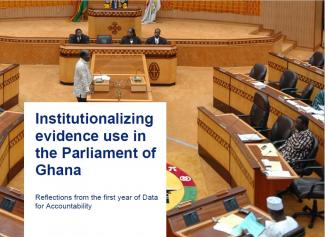
Institutionalizing evidence use in the Parliament of Ghana
Download publication files
Comprehensive data for monitoring the progress of SDG implementation is crucial to enable parliaments to perform their oversight and accountability role effectively. Data for Accountability (DAP) is an ambitious two-year project helping the Parliament of Ghana to improve national quality of life through evidence, by using data to oversee progress towards SDGs.
Led by African Centre for Parliamentary Affairs, and supported by INASP and the Ghana Statistical Service (GSS), the project seeks to build greater collaboration between data producers – in particular, the GSS - and parliament.
During a pandemic such as Covid-19, the need for evidence and data that ensures no part of the country is left behind is more important than ever. While there have been significant challenges for a project working with MPs in a year disrupted both by a general election and by the closure of parliament due to the Covid-19 pandemic, DAP has been able to take advantage of a key window of opportunity, and convergence of entry points in both parliament and the national statistics system to strengthen data use.
The end of 2020 provided an important midway point for the project partners to take stock, review progress and reflect on the learning generated on institutionalizing evidence use.
The project has rapidly made strides in effecting institutional and cultural changes related to appreciation and use of evidence and data - within both the parliament of Ghana and the Ghana Statistical Service (GSS). Project engagements have helped in shedding more light on the way the institutions operate, build trust as well as underscore the need and importance of collaborating – resulting in a number of unintended outcomes that go well beyond project expectations.
Our full learning and review is reflected in this report.
